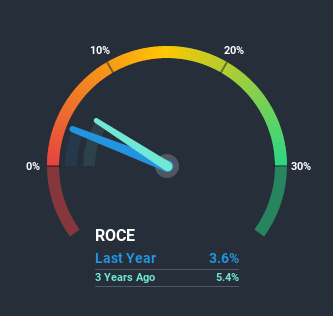Ignoring the stock price of a company, what are the underlying trends that tell us a business is past the growth phase? Typically, we'll see the trend of both return on capital employed (ROCE) declining and this usually coincides with a decreasing amount of capital employed. Ultimately this means that the company is earning less per dollar invested and on top of that, it's shrinking its base of capital employed. In light of that, from a first glance at Daios Plastics (ATH:DAIOS), we've spotted some signs that it could be struggling, so let's investigate.
What is Return On Capital Employed (ROCE)?
If you haven't worked with ROCE before, it measures the 'return' (pre-tax profit) a company generates from capital employed in its business. To calculate this metric for Daios Plastics, this is the formula:
Return on Capital Employed = Earnings Before Interest and Tax (EBIT) ÷ (Total Assets - Current Liabilities)
0.035 = €4.8m ÷ (€156m - €22m) (Based on the trailing twelve months to June 2020).
Thus, Daios Plastics has an ROCE of 3.6%. In absolute terms, that's a low return and it also under-performs the Chemicals industry average of 8.8%.
Check out our latest analysis for Daios Plastics

Historical performance is a great place to start when researching a stock so above you can see the gauge for Daios Plastics' ROCE against it's prior returns. If you're interested in investigating Daios Plastics' past further, check out this free graph of past earnings, revenue and cash flow.
How Are Returns Trending?
We are a bit worried about the trend of returns on capital at Daios Plastics. To be more specific, the ROCE was 6.8% five years ago, but since then it has dropped noticeably. On top of that, it's worth noting that the amount of capital employed within the business has remained relatively steady. Since returns are falling and the business has the same amount of assets employed, this can suggest it's a mature business that hasn't had much growth in the last five years. So because these trends aren't typically conducive to creating a multi-bagger, we wouldn't hold our breath on Daios Plastics becoming one if things continue as they have.
On a related note, Daios Plastics has decreased its current liabilities to 14% of total assets. That could partly explain why the ROCE has dropped. Effectively this means their suppliers or short-term creditors are funding less of the business, which reduces some elements of risk. Since the business is basically funding more of its operations with it's own money, you could argue this has made the business less efficient at generating ROCE.Our Take On Daios Plastics' ROCE
In summary, it's unfortunate that Daios Plastics is generating lower returns from the same amount of capital. Despite the concerning underlying trends, the stock has actually gained 15% over the last five years, so it might be that the investors are expecting the trends to reverse. Regardless, we don't like the trends as they are and if they persist, we think you might find better investments elsewhere.
If you want to know some of the risks facing Daios Plastics we've found 2 warning signs (1 makes us a bit uncomfortable!) that you should be aware of before investing here.
For those who like to invest in solid companies, check out this free list of companies with solid balance sheets and high returns on equity.
If you’re looking to trade Daios Plastics, open an account with the lowest-cost* platform trusted by professionals, Interactive Brokers. Their clients from over 200 countries and territories trade stocks, options, futures, forex, bonds and funds worldwide from a single integrated account. Promoted
New: Manage All Your Stock Portfolios in One Place
We've created the ultimate portfolio companion for stock investors, and it's free.
• Connect an unlimited number of Portfolios and see your total in one currency
• Be alerted to new Warning Signs or Risks via email or mobile
• Track the Fair Value of your stocks
This article by Simply Wall St is general in nature. It does not constitute a recommendation to buy or sell any stock, and does not take account of your objectives, or your financial situation. We aim to bring you long-term focused analysis driven by fundamental data. Note that our analysis may not factor in the latest price-sensitive company announcements or qualitative material. Simply Wall St has no position in any stocks mentioned.
*Interactive Brokers Rated Lowest Cost Broker by StockBrokers.com Annual Online Review 2020
Have feedback on this article? Concerned about the content? Get in touch with us directly. Alternatively, email editorial-team@simplywallst.com.
About ATSE:DAIOS
Daios Plastics
Produces and sells plastic films for agricultural applications in Europe and internationally.
Very low risk with weak fundamentals.
Market Insights
Community Narratives



